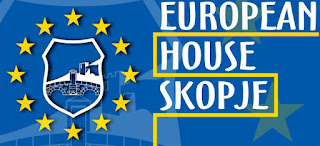"All Different - All Equal"
This campaign will be organised by the Council of Europe and the European Youth Forum.
In 2006, activities linked to the themes of the campaign will be given priority for EYF funding.
For more information, consult the Youth web site: www.coe.int/youth
Search This Blog
11.17.2005
The European flag – symbol of Europe's common values and unity
The European flag – symbol of Europe's common values and unity At a ceremony in Strasbourg today to mark the 50th anniversary of the European flag, the leaders of the major European institutions said that the flag, which represented the shared values of the Council of Europe and the European Union, was the symbol of a continent-wide unity that transcended national frontiers. The ceremony was brought to a close by twelve children, who placed the twelve stars on a giant flag spread out on the lawn of the Palais de l'Europe. (more ...)
Video of the event
Photo gallery
Radio and TV Spots
Special file
Video of the event
Photo gallery
Radio and TV Spots
Special file
Coyte Magazine

A magazine on issues around "Youth-Training-Europe", published once or twice a year. Its main target group is trainers and leaders of youth organisations. It contains articles written by experienced youth workers and specialists on issues of European-level youth worker training.
More...
11.13.2005
The dog barks

Throughout the prolonged spasm of rioting in France, now in its 17th day, one dog which has been strangely silent is the European Union. Quick to give its opinion – wanted or not – on any manner of issues, it has refrained to commenting, much less offering anything like criticism.Now, that silence is broken. El presidente Barroso has leapt into the foreground, not of course criticising France but actually offering money - €50 million, "to help it tackle problems in its suburbs that have provoked unrest”.According to Reuters, Barroso revealed his offer on Europe 1 radio, stating that the main challenge facing France in dealing with impoverished suburbs was to create youth employment, "The best social politics is to create employment," he said. "When you have 60 percent of youths unemployed in suburbs it is a problem." Interestingly, Barroso said he had offered to make the funds available in a letter to Villepin on Friday. "If the French authorities want to do this with us, it is possible to do it with a rescheduling of credits," he is reported as saying, which seems to suggest that this is not new money. Could it be that Barroso is grandstanding? Perish the thought.
11.10.2005
Balkans moving forward…
by Brussels Gonzo
The European Commission released its annual reports on enlargement yesterday, including a recommendation that Macedonia be recognised as an EU candidate. Eagerly anticipated (including by Doug Muir a few weeks back), but also pretty stunning given the difficulties the region has had, and given the general perception of enlargement fatigue.
However in my view this piece of good news is put in the shade by this morning’s Guardian story about likely Bosnian constitutional reform. Apparently a deal brokered by the Americans, but lubricated by the prospect of EU entry, “would give Bosnia the ’normal’ trappings of an integrated, non-ethnic parliamentary democracy: a national parliament with full legislative powers, central government and cabinet enjoying full executive power, and a titular head of state”.
The European Commission released its annual reports on enlargement yesterday, including a recommendation that Macedonia be recognised as an EU candidate. Eagerly anticipated (including by Doug Muir a few weeks back), but also pretty stunning given the difficulties the region has had, and given the general perception of enlargement fatigue.
However in my view this piece of good news is put in the shade by this morning’s Guardian story about likely Bosnian constitutional reform. Apparently a deal brokered by the Americans, but lubricated by the prospect of EU entry, “would give Bosnia the ’normal’ trappings of an integrated, non-ethnic parliamentary democracy: a national parliament with full legislative powers, central government and cabinet enjoying full executive power, and a titular head of state”.
Macedonia backed as EU candidate
The European Commission has recommended that Macedonia become a candidate country for EU membership.
Macedonia will be the third ex-Yugoslav republic to gain candidate status, after Slovenia - an EU member since 2004 - and Croatia.
The Commission did not set a date for starting entry talks with Macedonia, leaving that to December's EU summit.
It said Turkey could now be termed a functioning market economy but said it had to do more to respect human rights.
EU officials say that politically, Macedonia is an incredibly positive story, but that it still has a long way to go in terms of the economy and the public administration.
Weak and divided
The country stepped back from the brink of civil war in 2001, after the EU and Nato helped broker an agreement between ethnic Albanian rebels and the majority Slav population.
"Only a few years after a major security crisis, the former Yugoslav republic of Macedonia today is a stable democracy and a functioning multi-ethnic state," a Commission statement said.
"This is a remarkable achievement. The country has also made important progress towards European integration. The Commission welcomes this progress and recommends that the Council should grant candidate status to the country."
The Commission's annual progress reports on applicant countries, released on Wednesday, describe the Balkans as a particular challenge for the EU, a region where states are weak and societies divided.
All of them have been promised eventual EU membership, but the Commission makes clear they can only join once they have met the criteria in full.
It also admits that any further expansion will have to be better explained to the people of Europe.
http://news.bbc.co.uk
Macedonia will be the third ex-Yugoslav republic to gain candidate status, after Slovenia - an EU member since 2004 - and Croatia.
The Commission did not set a date for starting entry talks with Macedonia, leaving that to December's EU summit.
It said Turkey could now be termed a functioning market economy but said it had to do more to respect human rights.
EU officials say that politically, Macedonia is an incredibly positive story, but that it still has a long way to go in terms of the economy and the public administration.
Weak and divided
The country stepped back from the brink of civil war in 2001, after the EU and Nato helped broker an agreement between ethnic Albanian rebels and the majority Slav population.
"Only a few years after a major security crisis, the former Yugoslav republic of Macedonia today is a stable democracy and a functioning multi-ethnic state," a Commission statement said.
"This is a remarkable achievement. The country has also made important progress towards European integration. The Commission welcomes this progress and recommends that the Council should grant candidate status to the country."
The Commission's annual progress reports on applicant countries, released on Wednesday, describe the Balkans as a particular challenge for the EU, a region where states are weak and societies divided.
All of them have been promised eventual EU membership, but the Commission makes clear they can only join once they have met the criteria in full.
It also admits that any further expansion will have to be better explained to the people of Europe.
http://news.bbc.co.uk
Olli Rehn – Candidate status as recognition for the accomplished
The EU Commissioner for Enlargement, Olli Rehn visited Macedonia on 10 November 2005. On the meetings with the highest Macedonian authorities, the Commissioner elaborated the Opinion and the European Partnership Report and evaluated the progress that Macedonia has made and presented recommendation for what has to be done.“You’ve got a one-way ticket”, Rehn agreed with the comment of the Prime Minister Vlado Bučkovski, regarding EC’s recommendation to the EU Council to grant Macedonia status of candidate country for EU membership. The opinion is that Republic of Macedonia has stabile and functionate, democratic institutions respecting their competences and cooperating with each other.Rehn stated that submitting the application was the right step that contributed the process.“EU family will be incomplete as long as the Western Balkan countries remain outside it”, said Commissioner Rehn, reminding that those were his words during his first visit to Macedonia, one year ago.“Twelve months later, I bring you that assessment. It gives a thoroughly researched and carefully weighed analysis of the progress made by the country - as well as of the weaknesses which remain to be addressed before the country can make further progress towards the EU”, Commissioner Rehn said.The Commission has unanimously decided to recommend that the European Union should grant the status of candidate country to your country, in recognition of the country’s major achievements on the legislative framework related to the Ohrid Framework Agreement of 2001, and the progress made in the course of the four years of implementation of the Stabilisation and Association Agreement.”, Commissioner Rehn emphasised in his address to the members of the Macedonian Assembly.The Commissioner had meetings with the President of the Republic of Macedonia, Branko Crvenkovski, the Prime Minister of the Republic of Macedonia, Vlado Bučkovski, Deputy Prime Ministers of the Republic of Macedonia, Radmila Šekerinska and Musa Xhaferi, Minister of Foreign Affairs, Ilinka Mitreva and with the presidents of Macedonian political parties. Rehn attended special sessions of the Government and the Assembly of the Republic of Macedonia.
Фото галерија со слики од посетата на комесарот Рен е прикачена на следниот линк
Извор: http://www.sei.gov.mk
Фото галерија со слики од посетата на комесарот Рен е прикачена на следниот линк
Извор: http://www.sei.gov.mk
Subscribe to:
Comments (Atom)
European House Skopje is an NGO in Macedonia that promotes European values, democracy, human rights, and regional cooperation. Its...

-
Small Business Ideas You Can Run From Home If you have a desire to start a home-based business, you’re part of a growing trend. As a matter ...
-
Decentralising Structural Funds' management to the regional level Decentralised programming = Decentralised implementation? Or, Why (f...
-
• Chapter 1: Doing Business In Macedonia • Chapter 2: Seling Products and Services • Chapter 3: Leading Sectors for Export and Investment • ...